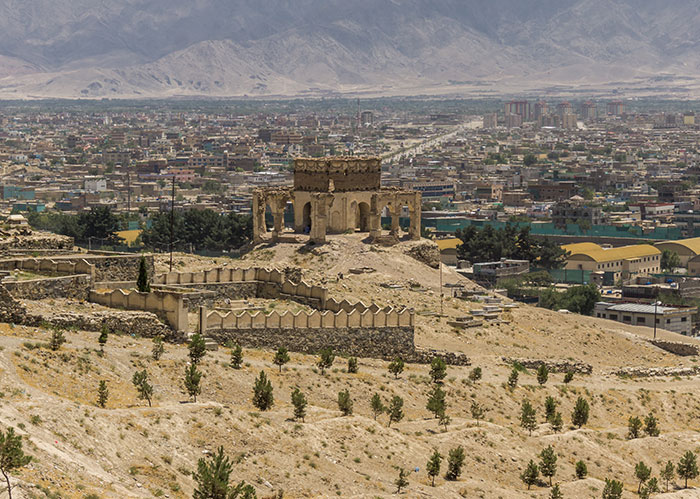Women in Afghanistan will now be forbidden from speaking and showing their faces in public. The country’s Taliban rulers issued the ban under new laws. They were approved by Afghanistan’s supreme leader, Hibatullah Akhundzada, before being issued on Wednesday (August 21).
After seizing power in the country in 2021, the Taliban set up a ministry for the Ministry of Propagation of Virtue and the Prevention of Vice (MOPVPV), enforcing strict moral and religious codes based on their interpretation of Islamic law.
The Taliban, which means “students” in the Pashto language, fought alongside the Mujahideen, Afghan rebels fighting the nine-year Soviet occupation, Al Jazeera explained in 2021.
The armed group is believed to have 85,000 full-time fighters across the country, and they exert control over more than half of the country’s roughly 400 districts.
Women in Afghanistan will now be forbidden from speaking and showing their faces in public

On Wednesday, the MOPVPV published its new laws, which cover aspects of everyday life like public transportation, music, shaving, and celebrations.
The laws are set out in a 114-page, 35-article document seen by the Associated Press (AP) and are the first formal declaration of vice and virtue laws in Afghanistan since the takeover.
“Inshallah we assure you that this Islamic law will be of great help in the promotion of virtue and the elimination of vice,” the ministry’s spokesman, Maulvi Abdul Ghafar Farooq, said on Thursday (August 23).
It’s important to note that the views and practices of the Taliban do not represent the beliefs of all Muslims, as Islam is interpreted and practiced in diverse ways worldwide, similar to Christianity, Judaism, and other religions.
The new laws empower the ministry to be at the frontline of regulating personal conduct, administering punishments like warnings or arrests if enforcers allege that Afghans have broken the laws, the AP reported on Thursday.
Article 13 reportedly relates to women. It says it is mandatory for a woman to veil her body at all times in public and that a face covering is essential to avoid temptation and tempting others.
Moreover, clothing should not be thin, tight, or short. Women are obliged to cover themselves in front of non-Muslim males and females to avoid being corrupted, the AP reported.
The country’s Taliban rulers issued the ban under new laws

A woman’s voice is deemed intimate, so they should not be heard singing, reciting, or reading aloud in public. It is forbidden for women to look at men they are not related to by blood or marriage and vice versa, as per the AP.
Additionally, Article 17 bans the publication of images of living beings, while Article 19 bans the playing of music, the transportation of solo female travelers, and the mixing of men and women who are not related to each other.
The law also obliges passengers and drivers to perform prayers at designated times, the AP reported.
The MOPVPV’s official website explains its mission to promote prayer, align Muslims’ appearances, morals, and behaviors with Islamic law, encourage women to observe the Sharia veil, and invite people to adhere to the Five Pillars of Islam and all Islamic rulings.

The ministry further prevents people from engaging in activities prohibited by Islam, such as drinking alcohol, adultery, theft, and immodesty.
The Taliban’s takeover of Afghanistan has severely impacted girls and women, particularly by restricting their access to education and employment.
Girls above sixth grade have been banned from attending school, and women are currently prohibited from most jobs outside healthcare and education.
For instance, female students were barred from universities in December 2022, effectively eliminating their higher education prospects. These measures have drastically limited the rights and opportunities of Afghan women and girls, reversing decades of progress.
The rules were approved by Afghanistan’s supreme leader, Hibatullah Akhundzada, before being issued on August 21

“The Taliban war against women and gender apartheid in Afghanistan is nothing new,” researcher and human rights expert Horia Mosadiq told Bored Panda in an email on Friday (August 23).
“What is new is that the international community, including the United Nations, had become very tolerant towards gender apartheid in Afghanistan and seeking any avenue to work and support the Taliban.”
The United Nations has engaged with the Taliban primarily through diplomatic and humanitarian channels to address the severe humanitarian crisis in Afghanistan.
This engagement includes negotiating the delivery of aid, ensuring access to basic services for the Afghan population, and advocating for the protection of human rights, particularly those of women and girls.
However, this engagement has been controversial, as some critics, including Horia, argue it may legitimize the Taliban’s regime and its oppressive policies, particularly against women, while trying to prevent a humanitarian disaster.

Some of the latest United Nations’ humanitarian involvement with the Taliban occurred in May 2024, when intense flooding in northern and western Afghanistan caused significant destruction, killing at least 225 people and damaging thousands of homes.
“If there is anything other countries should be doing [it] is to support the women of Afghanistan in their fight against gender apartheid and do everything to hold the Taliban accountable,” Horia urged.
On March 21, 2022, the Taliban promised to reopen all schools in Afghanistan, seemingly ending the temporary ban it had placed on girls attending secondary school since its return to power seven months earlier, Sultan Barakat, professor in Conflict and Humanitarian Studies at Qatar Foundation’s Hamad Bin Khalifa University, explained.
However, two days later, while many girls were enthusiastically preparing to return to school, the authorities reversed the decision and restricted girls over the age of 12 from attending state-run schools, the honorary professor of the University of York explained for Al Jazeera in April 2024.
A human rights expert told Bored Panda that the Taliban perpetuated “gender apartheid”

The government went on to ban girls and young women in Afghanistan from higher education, prompting experts to point out that these anti-education edicts stood against the foundations of Islam.
“The Taliban’s stance on this issue defies both worldly and religious logic,” Sultan argued. He further countered: “The exclusion of girls from education also contradicts the Taliban’s aim to build a gender-segregated society.”
“How can women have dedicated healthcare when no female healthcare workers are trained in the country?”
The professor added: “From the religious perspective, too, the Taliban leaders must realize that they are accountable before Allah SWT for thrusting ignorance upon a generation of girls just so they can claim a perceived localized victory of tradition.”
“This can make a sane woman lose her mind,” a reader commented



















